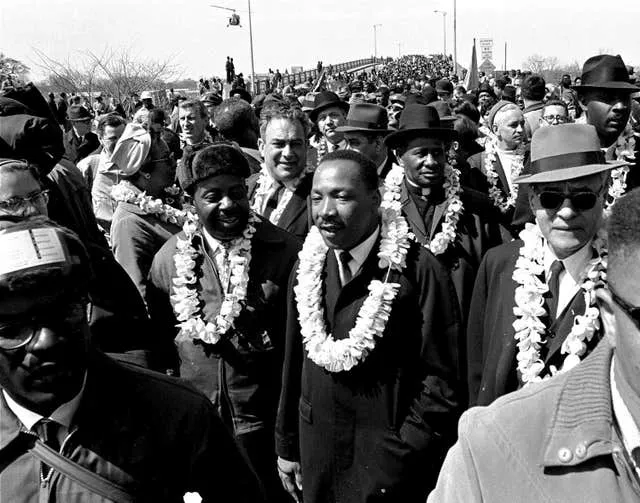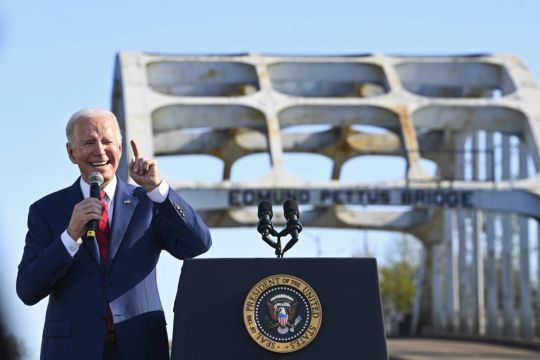President Joe Biden used the searing memories of Selma’s Bloody Sunday to recommit to a cornerstone of democracy, lionising a seminal moment from the civil rights movement at a time when he has been unable to push enhanced voting protections through Congress and a conservative Supreme Court has undermined a landmark voting law.
“Selma is a reckoning.
“The right to vote … to have your vote counted is the threshold of democracy and liberty. With it anything’s possible,” Mr Biden told a crowd of several thousand people seated on one side of the historic Edmund Pettus Bridge, named after a reputed Ku Klux Klan leader.
“This fundamental right remains under assault.
“The conservative Supreme Court has gutted the Voting Rights Act over the years.
“Since the 2020 election, a wave of states and dozens and dozens of anti-voting laws fuelled by the Big Lie and the election deniers now elected to office,” he said.

As a candidate in 2020, Mr Biden promised to pursue sweeping legislation to bolster protection of voting rights.
Two years ago, his 2021 legislation, named after civil right leader John Lewis, the late Georgia congressman, included provisions to restrict partisan gerrymandering of congressional districts, strike down hurdles to voting and bring transparency to a campaign finance system that allows wealthy donors to bankroll political causes anonymously.
It passed the then-Democratic-controlled House, but it failed to draw the 60 votes needed to advance in a Senate under control by Mr Biden’s party.
With Republicans now running of the House, passage of such legislation is highly unlikely.
600 believers put faith into action to march across Edmund Pettus Bridge to claim their fundamental right to vote.
Through forces of hate conspired for their demise, they endured.
They forced the country to confront hard truths, to act, and to keep the promise of America alive. pic.twitter.com/vxUwYhtDZIAdvertisement— President Biden (@POTUS) March 6, 2023
“We know we must get the votes in Congress,” Mr Biden said, but there seems no viable path right now.
The visit to Selma was a chance for Mr Biden to speak directly to the current generation of civil rights activists.
Many feel let down because of the lack of progress on voting rights and they are eager to see his administration keep the issue in the spotlight.
Few moments have had as lasting importance to the civil rights movement as what happened on March 7 1965, in Selma and in the weeks that followed.

Some 600 peaceful demonstrators led by Mr Lewis and fellow activist Hosea Williams had gathered that day, just weeks after the fatal shooting of a young Black man, Jimmie Lee Jackson, by an Alabama trooper.
Mr Lewis and the others were brutally beaten by Alabama troopers and sheriff’s deputies as they tried to cross the Edmund Pettus Bridge at the start of what was supposed to be a 54-mile walk to the state Capitol in Montgomery as part of a larger effort to register Black voters in the South.
“On this bridge, blood was given to help redeem the soul of America,” Mr Biden said.
The images of the police violence sparked outrage across the country.
Days later, civil rights leader Martin Luther King Jr led what became known as the Turnaround Tuesday march, in which marchers approached a wall of police at the bridge and prayed before turning back.
President Lyndon B Johnson introduced the Voting Rights Act of 1965 eight days after Bloody Sunday, calling Selma one those rare moments in US history where “history and fate meet at a single time”.
On March 21, Dr King began a third march, under federal protection, that grew by thousands by the time they arrived at the state Capitol. Five months later, Mr Johnson signed the bill into law.







